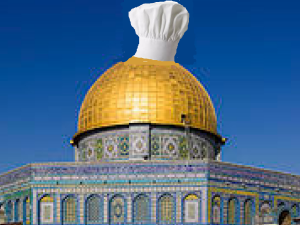“We’ve seen it with falafel, and to a similar extent with hummus, tahini, shakshuka, shawarma, sabih, and numerous other Near Eastern and Levantine dishes.”
 Jerusalem, August 9 – Ohr Ben-Zikri, 22, might have finished only one year of culinary school, but she already has her eyes set on an ambitious goal: to create new delicacies for purposes of having them invoked or fought over in the protracted conflict between Jews and Arabs in the Middle East.
Jerusalem, August 9 – Ohr Ben-Zikri, 22, might have finished only one year of culinary school, but she already has her eyes set on an ambitious goal: to create new delicacies for purposes of having them invoked or fought over in the protracted conflict between Jews and Arabs in the Middle East.
Ben-Zikri has experimented widely with both familiar and exotic ingredients, and peers and faculty alike agree she has an eye for the aesthetic, a keen sense of flavor contrasts, and a sensibility over cost that few chefs her age have yet cultivated. The Hod HaSharon native hopes to employ those those assets into the development of dishes that gain enough popularity that they become the focus of vehement political disputes over indigenous status, authenticity, appropriation, and bigotry.
“I can see it now,” she mused in a telephone interview. “I come up with a street-food-type dish that captures the flavor of the region, and it immediately attracts the attention of Palestinian activists protesting a usurpation of their cultural heritage, followed by rebuttals from Israel-supporters. That’s when I’ll know I’ve hit the big time.”
Ben-Zikri has already wowed her instructors with sassy reinterpretations of classic dishes, and with a mastery of kitchen techniques that puts her at the top of her class. Upon earning her certification, the aspiring maestro of cuisine aims to become a sous-chef or apprentice at one of the finer establishments in Tel Aviv or Jerusalem, where she can work on adapting her ideas to the real world of restaurant and hotel kitchens. Only then, she admits, can her ambition of creating the next big political food gain traction.
“We’e seen it with falafel, and to a similar extent with hummus, tahini, shakshuka, shawarma, sabih, and numerous other Near Eastern and Levantine dishes,” she explained. “Much of that occurred organically. But I feel the culinary world needs an infusion of new conflict foods, and an innovative culinary environment such as Israel is the perfect place to pursue such a goal.”
“Gone are the days when you can just push a cart through the street with the latest controversial thing,” she continued. “Those foods have long since been over-discussed in this respect. You can tell even the hyper-partisan parties are tired of talking about the political implications of couscous. I have some ideas that I believe will eventually take center stage in vehement arguments over whose food it is, and how dare anyone else claim it. It’s going to be fun.”
Please support our work through Patreon.




